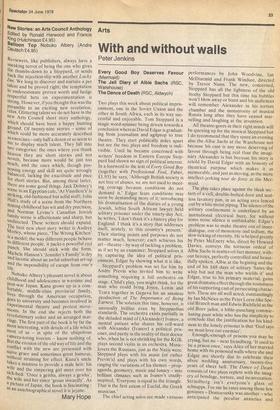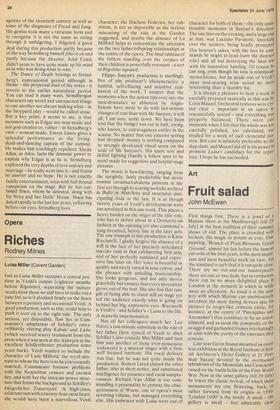Arts
With and without walls
Peter Jenkins
Every Good Boy Deserves Favour (Mermaid) The Jail Diary of Alble Sachs (RSC, Warehouse) The Dance of Death (RSC, Aidwych) Two plays this week about political imprisonment, one in the Soviet Union and the other in South Africa, each in its way suc cessful and enjoyable. Tom Stoppard is a magic word-spinner being driven towards a conclusion whereas David Edgar is graduat ing from journalism and agitprop to true theatre. They start politically miles apart but see the two plays and freedom is indi visible. Until he became concerned with writers' freedom in Eastern Europe Stop pard had shown no sign of political interest.
In a foreword to the text of Every Good Boy (together with Professional Foul, Faber, £1.95) he says, 'Although British society is not free of abuses, we are not used to meeting courage because conditions do not demand it.' Edgar fears conditions may soon be demanding more of it; introducing his dramatisation of the diaries of a young Jewish, leftist South African lawyer held solitary prisoner under the ninety-day Act, he Writes, 'I don't think it's a history play for England. I think it's a story that addresses itself, acutely, to this country's present.' Their starting points and purposes do not matter much, however; each achieves his art — theatre —by way of tackling a problem, as if set by an examiner: Stoppard solves it by capturing the idea of political prisonment, Edgar by showing what it is like.
Stoppard's problem was set for him by Andre Previn who invited him to write something requiring a full orchestra on stage. Child's play, you might think, for the man who could bring Joyce, Lenin and Tzara together in Geneva for an amateur production of The Importance of Being Earnest. The solution this time, however, is unusually brillint even by Stoppardian standards. The orchestra exists partially in the deluded mind of (Alexander) Ivanov, a ,mental patient who shares his cell-ward with Alexander (Ivanov) a political prisoner, and partly in the reality of their doctor who, .when he is not shrinking for the KGB, plays second violin in an orchestra. Musiclovers the Russians, just as the Nazis were. Stoppard plays with his music (or rather Previn's) and plays with his own words, ringing the variations of his themes — propaganda, geometry, music and lunacy — into brilliant climaxes such as Ivanov's crazilyinspired, 'Everyone is equal to the triangle. That is the first axiom of Euclid, the Greek musician.'
The chief acting solos are made virtuoso performances by John Woodvine, Ian McDiarmid and Frank Windsor, directed by Trevor Nunn. The new, concerned, Stoppard has all the lightness of the old frothy Stoppard but this time his bubbles won't blow away or burst and his audiences will remember Alexander in his torture chamber and the monstrosity of musical Russia long after they have ceased marvelling and laughing at the invention.
All theatre-goers in their right minds will be queuing up for the musical Stoppard but I do recommend that they spare an evening also the Albie Sachs at the Warehouse not because his case is any more deserving of favour through being real than the imaginary Alexander is but because his story is retold by David Edgar with an honesty of theatrical purpose which makes it as memorable, and just as moving, as the more intellect-jerking tour de force at the Mermaid.
The play takes place against the bleak sec tion of a cell, double-bolted door and seatless lavatory pan, in an acting area fenced out by white metal piping. The silence of the solitary confinement is underlined by an institutional electrical buzz, for without some noise silence is unthinkable. Edgar's problem was to make theatre out of innerdialogue, out of monotony and tedium, the slow ticking of eternity. He is helped greatly by Peter McEnery who, direct by Howard Davies, conveys the tortuous ordeal of Albie Sachs in matter-of-fact manner, without heroics, perfectly controlled and beautifully spoken. Albie at the begining and the end of his 168 days of solitary 'hates the whip but not the man who wields it' and Edgar, true to his primary material, gains great dramatic effect through the roundness of his supporting cast of persecuting charac ters. These are all well acted, outstandingly by Ian McNeice as the Peter Lorre-like Special Branch man and Edwin Richfield as the old Boer jailor, a bible-punching commiehating poor white who has the simplicity to conclude that the justification for his kindness to the lonely prisoner is that 'God says we must love our enemies'.
Enough,-enough of prisons you may be crying, but no — next Strindberg. 'It used to be a prison once,' says Alice of her married home with its poisoned walls where she and Edgar are shortly due to celebrate their silver wedding anniversary, twenty-five
years of sheer hell. The Dance of Death
consists of two plays replete with the imagery of bondage, torture, and incarceration.
Strindberg isn't everyone's glass of schnapps. For me he rates among those few geniuses — Dostoevesky was another — who anticipated the peculiar anxieties and
agonies of the twentieth century as well as some of the diagnoses of Freud and Jung.
His genius took many a tiresome form and to recognise it is not the same as sitting through it unfidgeting. I fidgeted a good deal during this production partly because of the way Strindberg himself piles it on and partly because the director, John Caird, didn't seem to have quite made up his mind as to who was doing what to who.
The Dance of Death belongs to Strindberg's expressionist period although in theme — the perpetual duel of the sexes — it
reverts to the earlier naturalistic period. You can read it many ways. Strindbergian characters say weird and unexpected things to one another not always making what — in the Stoppard play — would be called sense.
But a key point, it seems to me, is that monsters such as Edgar are man-made and not god-created or, rather — in Strindberg's
view — woman-made. Emrys James gives a
splendid performance as the livingdead-and-dancing captain of the outpost.
He makes him touchingly repellent. Sheila Allen, as Alice, lacks the demonic power to explain why Edgar is as he is. Strindberg
explored the very depths of love and sex and marriage — he really went into it —and found no answer and no hope. He is not exactly
family entertainment, what with full-frontal vampirism on the stage. But he has out lasted Ibsen, whom he detested, along with his Nora and her Dolls' House. Ibsen has dated rapidly in the last few years, yellowing before our eyes. Strindberg lives.















































 Previous page
Previous page